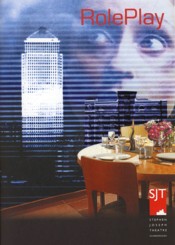Act 1
Scene 1
The play opens where Justin Lazenby and Julie-Ann Jobson are busy preparing for a dinner party. Julie-Ann's parents are expected, as is Justin's mother with her current "man-friend". It is intended Justin will announce their engagement but, there are already warning signs that they are perhaps not fully compatible. Julie-Ann's desperation to get every detail perfect isn't a good sign, neither is Justin's reaction to her suggestion of living chastely apart until their wedding night. In the meantime, Justin receives a series of phone calls from his mother, Arabella, indicating that she will be both drunk and late.
However, after Julie-Ann leaves in search of a replacement for a missing fork, a bigger problem emerges: a woman falls into Justin's balcony. She is Paige Petite, who climbed out of the window of the penthouse she lives in, on the run from her violent gangster boyfriend, Rudi, who mistakenly believes she cheated on him. Before she can leave, Paige's "minder", Micky Rale, enters, having gone in search of her. Paige refuses to go back with him, and Micky refuses to leave without her. Julie-Ann returns to discover Paige (having earlier taken a bath) wearing the dress she was intending to wear. Julie-Ann demands Paige takes off the dress, but it ends with Micky pointing a gun at Justin and insisting Julie-Ann helps herself to one of Paige's dresses upstairs. After Julie-Ann leaves, Micky acknowledges Justin is holding a party this evening and asks "Is there anything we can do to help?"
Scene 2
In the second scene, Justin, Micky and Paige are still waiting for Julie-Ann's return. Julie-Ann's parents from Doncaster, Derek and Dee Jobson, arrive first. They instantly warm to Justin, but whilst it is clear they regard Julie-Ann (nicknamed "our apple") with far more fondness than their other two daughters. When Julie-Ann finally returns, it is in one of Paige's revealing dresses, much to her parents' horror.
When Justin's mother, Arabella, finally arrives, it is without her "man-friend" Olaf, who was ditched en route. Very drunk, she mistakes Paige for Justin's fiancée and says Justin has finally struck gold. When Justin eventually manages to point out which girl Julie-Ann really is, she says "He's done it again! Another bloody dog." Julie-Ann leaves in tears, Arabella collapses on the sofa, and the Act closes with Justin cheerfully saying "Soup anyone?"
Act 2
The second act takes place after the dinner. In spite of Arabella spending the entire dinner unconscious, and Paige and Micky joining the meal and messing up the cutlery arrangement, things have evidently gone well. Julie-Ann, having swapped dresses with Paige at some point, attempts to make things up with Arabella, although Arabella never seems to grasp which girl is which. However, things start to go downhill when Derek has a private word with Justin. Derek suggests Justin should move up to Doncaster to take over his garden centre business, oblivious to Justin's hints that he is not interested. Furthermore, Justin learns from Derek that the reason Derek and Dee fell out with Julie-Ann's two sisters was because one of them is a lesbian and the other married a Chinese man.
Meanwhile, Micky takes the occasional phone call from an angry Rudi, now returning from a boxing match in Birmingham (where all his fighters lost). Paige gets increasingly fearful of what he will do to her when he returns, but Micky refuses to change his mind – not because he wishes this on her, but because he is doing his job. In spite of this, Paige rescues Micky when Arabella takes an interest in his boxing career, claiming he was brilliantly successful when in fact he was a dismal failure. After Arabella falls and breaks fourteen glasses, the evening starts to fall flat. Derek makes a few lame jokes that his family find hilarious, then attempts to start a couple of racist jokes. Undeterred, Julie-Ann insists on Justin's speech. Justin attempts to start with "It's with great pleasure ..." but keeps stalling on "It's ...", and instead breaks into It's a Long Way to Tipperary.
The conversation then moves to Paige's common-sounding voice, and she says it was down to a motorbike accident she had when she was younger – a story that Justin correctly suspects she made up. Arabella then suggests Paige does a dance as her party piece, (having earlier misunderstood what kind of "dancer" she is). Paige, having been incensed by the Jobsons over the evening, agrees and gives Justin a lap dance, before Julie-Ann attacks her. Considering the evening a write-off, Justin gets his mother away into a taxi before Julie-Ann talks to him. She forgives him, but in a way that implies that she expects Justin to take up Derek's garden centre offer to stay together.
The doorbell rings, which Justin believes to be Rudi. He is all set to deny everything, but it is only Arabella, having only made it a few hundred yards instead of to Godalming. Micky, having warmed to Arabella, and moved by Paige's story of her accident, not to mention fear of his getting hurt too when Rudi returns, offers to take Arabella home in Rudi's favourite car, thereby setting Paige free. Justin gives Paige some money to get on her way, but by now he wants an escape from his own life. He persuades Paige to take him with her. They leave together, and the play ends just as Rudi's gangsters are trying to force their way through the door to a surprised Derek and Dee.
